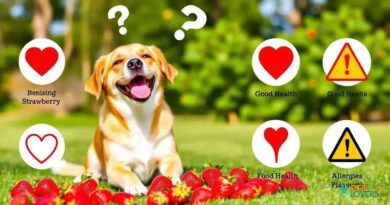What is: Accidental poisoning in dogs
What is Accidental Poisoning in Dogs?
Accidental poisoning in dogs refers to the unintentional ingestion of toxic substances that can lead to serious health issues or even death. This can occur when dogs consume household items, plants, or food that are harmful to them. Understanding the various causes and symptoms of accidental poisoning is crucial for every dog owner to ensure their pet’s safety.
Common Causes of Accidental Poisoning
There are numerous everyday items that can pose a risk to dogs. Common causes include human foods such as chocolate, grapes, and onions, which are toxic to canines. Additionally, household products like cleaning agents, antifreeze, and certain medications can lead to poisoning if ingested. It’s essential for pet owners to be aware of these dangers and take preventive measures to keep their dogs safe.
Symptoms of Accidental Poisoning
Recognizing the symptoms of accidental poisoning in dogs is vital for prompt treatment. Symptoms can vary widely depending on the toxin but may include vomiting, diarrhea, lethargy, seizures, and difficulty breathing. In some cases, dogs may exhibit unusual behavior or show signs of distress. If you suspect your dog has been poisoned, it is crucial to seek veterinary care immediately.
Immediate Actions to Take
If you believe your dog has ingested a toxic substance, the first step is to remain calm. Assess the situation and try to identify what your dog has consumed. Contact your veterinarian or an emergency animal poison control hotline for guidance. They may instruct you to induce vomiting or bring your dog in for treatment, depending on the situation.
Prevention Strategies
Preventing accidental poisoning in dogs involves a combination of education and vigilance. Keep harmful substances out of reach by storing them in secure cabinets and using child-proof locks if necessary. Educate family members and guests about the dangers of feeding dogs human food and ensure that all household members are aware of the potential risks associated with common household items.
Common Household Toxins
Some of the most common household toxins that can lead to accidental poisoning in dogs include chocolate, xylitol (a sugar substitute), certain plants like lilies and azaleas, and various cleaning products. Familiarizing yourself with these substances can help you create a safer environment for your dog and reduce the risk of accidental ingestion.
Veterinary Treatment Options
When a dog is brought to the veterinarian for suspected poisoning, the treatment will depend on the type of toxin ingested. Common treatments may include inducing vomiting, administering activated charcoal to absorb toxins, or providing intravenous fluids to support the dog’s recovery. In severe cases, hospitalization may be required for more intensive care.
Long-Term Effects of Poisoning
Some dogs may experience long-term effects after recovering from accidental poisoning, depending on the severity of the incident and the type of toxin involved. Potential long-term issues can include organ damage, neurological problems, or chronic health conditions. Regular veterinary check-ups are essential for monitoring your dog’s health following a poisoning incident.
Resources for Dog Owners
Dog owners should familiarize themselves with resources available for dealing with accidental poisoning. The ASPCA Poison Control Center and the Pet Poison Helpline are valuable resources that provide information and assistance in emergency situations. Having these contacts readily available can make a significant difference in ensuring your dog’s safety.
Conclusion
Understanding what accidental poisoning in dogs entails is crucial for every pet owner. By being informed about potential hazards, recognizing symptoms, and knowing how to respond, you can help protect your furry friend from the dangers of toxic substances.


